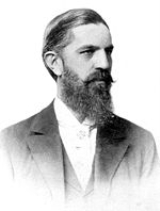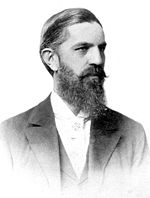
Christian Social Movement in Ukraine
Encyclopedia
The Christian Social Movement in Ukraine was a political movement that existed in Western Ukraine from the end of the 19th century until the 1930s.
s focused on social concerns whilst its political orientation was clerical-conservative. The movement's leaders included the Ukrainian political and cultural figure Oleksander Barvinsky
, Anatole Vakhnianyn
, and Kyryl Studynsky
. The Christian Social Movement's support was based on Ukrainian moderates seeking rapproachment between Ukrainians
and Poles
. Originally its principles included loyalty to Austria–Hungary and the Habsburg monarchy, the creation of a separate Ukrainian province, support for the Ukrainian language and expansion of Ukrainian schools, and opposition to Galician Russophiles
.
 Its political party, founded in 1896, was originally named the Catholic Ruthenian People's Union. During this time, it was supported by Metropolitan
Its political party, founded in 1896, was originally named the Catholic Ruthenian People's Union. During this time, it was supported by Metropolitan
Sembratovich, head of the Ukrainian Greek Catholic Church
, and by the Austrian government, which subsidized the newspaper Ruslan. In 1911 the Catholic Ruthenian People's Union, under the leadership of Oleksander Barvinky, renamed itself as the Christian Social Party and sent representatives to the Austrian Parliament in Vienna as well as to the local Galician Diet
. After Austria-Hungary's collapse, the Christian Social Party subsequently participated in the formation of the West Ukrainian National Republic
. Following the Polish–Ukrainian War, after western Ukraine had passed under the control of the Second Polish Republic
, the party continued to function until the 1930s. At that time, part of its members joined the Ukrainian National Democratic Alliance
(UNDO) (a moderate political organization opposed to the radical Organization of Ukrainian Nationalists
), while others founded the Ukrainian Catholic People's Party.
In the Second World War
, western Ukraine was annexed by the Soviet Union
and the Christian Social Movement ceased to exist there.
Due to its ties to the Ukrainian Greek Catholic Church
, the Christian Social Movement was criticized for its Clericalism
by both left-wing socialist groups as well as by right-wing nationalist groups in western Ukraine.
Ideals
Its programme was based on Christian ethics and on papal encyclicalEncyclical
An encyclical was originally a circular letter sent to all the churches of a particular area in the ancient Catholic Church. At that time, the word could be used for a letter sent out by any bishop...
s focused on social concerns whilst its political orientation was clerical-conservative. The movement's leaders included the Ukrainian political and cultural figure Oleksander Barvinsky
Oleksander Barvinsky
Oleksander Barvinsky was an important western Ukrainian cultural figure and politician, a founder of the Christian Social Party in western Ukraine. He also was a member of the Austrian parliament, chaired the Shevchenko Scientific Society and held the post of secretary of education and religious...
, Anatole Vakhnianyn
Anatole Vakhnianyn
Anatole Vakhnianyn , was a Ukrainian political and cultural figure, composer, teacher and journalist.-Biography:Vakhnianyn was born in Sieniawa, Przeworsk County, today a part of Poland but at that time a part of the Austrian Empire. He came from a clerical family; his father, Klym Vakhnianyn, and...
, and Kyryl Studynsky
Kyryl Studynsky
Kyryl Studynsky , was a western Ukrainian political and cultural figure from the late-19th to the mid-20th century. One of the principal figures within the Christian Social Movement in Ukraine, in 1939 Studynsky became head of the People's Assembly of Western Ukraine following the Soviet...
. The Christian Social Movement's support was based on Ukrainian moderates seeking rapproachment between Ukrainians
Ukrainians
Ukrainians are an East Slavic ethnic group native to Ukraine, which is the sixth-largest nation in Europe. The Constitution of Ukraine applies the term 'Ukrainians' to all its citizens...
and Poles
Poles
thumb|right|180px|The state flag of [[Poland]] as used by Polish government and diplomatic authoritiesThe Polish people, or Poles , are a nation indigenous to Poland. They are united by the Polish language, which belongs to the historical Lechitic subgroup of West Slavic languages of Central Europe...
. Originally its principles included loyalty to Austria–Hungary and the Habsburg monarchy, the creation of a separate Ukrainian province, support for the Ukrainian language and expansion of Ukrainian schools, and opposition to Galician Russophiles
Ukrainian Russophiles
The focus of this article is part of a general political movement in Western Ukraine of the nineteenth and early 20th century. The movement contained several competing branches: Moscowphiles, Ukrainophiles, Rusynphiles, and others....
.
History

Metropolitan bishop
In Christian churches with episcopal polity, the rank of metropolitan bishop, or simply metropolitan, pertains to the diocesan bishop or archbishop of a metropolis; that is, the chief city of a historical Roman province, ecclesiastical province, or regional capital.Before the establishment of...
Sembratovich, head of the Ukrainian Greek Catholic Church
Ukrainian Greek Catholic Church
The Ukrainian Greek Catholic Church , Ukrainska Hreko-Katolytska Tserkva), is the largest Eastern Rite Catholic sui juris particular church in full communion with the Holy See, and is directly subject to the Pope...
, and by the Austrian government, which subsidized the newspaper Ruslan. In 1911 the Catholic Ruthenian People's Union, under the leadership of Oleksander Barvinky, renamed itself as the Christian Social Party and sent representatives to the Austrian Parliament in Vienna as well as to the local Galician Diet
Diet (assembly)
In politics, a diet is a formal deliberative assembly. The term is mainly used historically for the Imperial Diet, the general assembly of the Imperial Estates of the Holy Roman Empire, and for the legislative bodies of certain countries.-Etymology:...
. After Austria-Hungary's collapse, the Christian Social Party subsequently participated in the formation of the West Ukrainian National Republic
West Ukrainian National Republic
The West Ukrainian People's Republic was a short-lived republic that existed in late 1918 and early 1919 in eastern Galicia, that claimed parts of Bukovina and Carpathian Ruthenia and included the cities of Lviv , Przemyśl , Kolomyia , and Stanislaviv...
. Following the Polish–Ukrainian War, after western Ukraine had passed under the control of the Second Polish Republic
Second Polish Republic
The Second Polish Republic, Second Commonwealth of Poland or interwar Poland refers to Poland between the two world wars; a period in Polish history in which Poland was restored as an independent state. Officially known as the Republic of Poland or the Commonwealth of Poland , the Polish state was...
, the party continued to function until the 1930s. At that time, part of its members joined the Ukrainian National Democratic Alliance
Ukrainian National Democratic Alliance
The Ukrainian National Democratic Alliance, was the largest Ukrainian political party in the Second Polish Republic, active in territory that is currently Western Ukraine. It dominated the mainstream political life of the Ukrainian minority in Poland, which with almost 14% of Poland's population...
(UNDO) (a moderate political organization opposed to the radical Organization of Ukrainian Nationalists
Organization of Ukrainian Nationalists
The Organization of Ukrainian Nationalists is a Ukrainian political organization which as a movement originally was created in 1929 in Western Ukraine . The OUN accepted violence as an acceptable tool in the fight against foreign and domestic enemies particularly Poland and Russia...
), while others founded the Ukrainian Catholic People's Party.
In the Second World War
World War II
World War II, or the Second World War , was a global conflict lasting from 1939 to 1945, involving most of the world's nations—including all of the great powers—eventually forming two opposing military alliances: the Allies and the Axis...
, western Ukraine was annexed by the Soviet Union
Soviet Union
The Soviet Union , officially the Union of Soviet Socialist Republics , was a constitutionally socialist state that existed in Eurasia between 1922 and 1991....
and the Christian Social Movement ceased to exist there.
Due to its ties to the Ukrainian Greek Catholic Church
Ukrainian Greek Catholic Church
The Ukrainian Greek Catholic Church , Ukrainska Hreko-Katolytska Tserkva), is the largest Eastern Rite Catholic sui juris particular church in full communion with the Holy See, and is directly subject to the Pope...
, the Christian Social Movement was criticized for its Clericalism
Clericalism
Clericalism is the application of the formal, church-based, leadership or opinion of ordained clergy in matters of either the church or broader political and sociocultural import...
by both left-wing socialist groups as well as by right-wing nationalist groups in western Ukraine.

